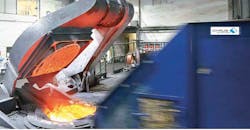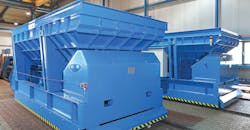Mobile Scrap Charging for a Green Transition
An Italian gray and ductile iron foundry, Officine e Fonderie De Riccardis, has a history dating back more than 80 years, but it has a forward-looking approach to manufacturing and corporate responsibility. The third-generation, privately owned business is committed to producing castings sustainably, to ensure the health of their workers and reduce the operation’s carbon footprint.
The plant in Galatina supplies cast parts for mechanical applications, including agricultural equipment, as well as energy sector products. The plant pours up to 140 tons/day of molten iron, which until recently has been melted in rotary kilns that do not allow charging of scrap iron. That molten iron is transferred to holding furnaces.
Due to the inefficiency of this set-up, the holding furnaces must also be fed during production downtime, which consumes energy unnecessarily – and provides another reason for De Riccardis to look forward to a new melting operation, with a significant amount of energy to be drawn from an extensive array of solar panels installed on the premises. Another part of this “green transition” is to replace the old rotary melting and holding equipment with three medium-frequency electric furnaces.The need for machinery to charge scrap material into those electric furnaces led De Riccardis to Cyrus Equipment, a General Kinematics company in Essen, Germany that manufactures machines for charging furnaces, vibratory conveyors, screening, and other heavy-duty material handling. Specifically, De Riccardis wanted a supplier with strong technical knowledge about its foundry operation and record of its own in the sector, plus after-sales assistance and reliability. “We believe that GK/Cyrus has all the above characteristics. Furthermore, from the first meeting, GK proved to be a competent and enthusiastic partner of the Fonderie De Riccardis project, deciding to fully embrace its vision and objectives,” Alessia De Riccardis stated.
The new electric furnaces need to be charged with scrap by a specialized mobile-charging machine, which addressed De Riccardis desire for a small footprint, compatibility with solar power, and customizability.
The new machine occupies just 11 cubic meters of space, but has a charging capacity of 40-70 tph, operating at a drive speed of approximately 18 cm/second.
At Fonderie De Riccardis, the new layout will have 10-ton bridge cranes with magnets, to feed scrap iron to the charger efficiently. The charger's electronic design is planned to work seamlessly with the plant's new solar-powered system, supporting their objective of sustainable production. “[Cyrus’] technical and commercial assistance has proved to be highly professional and proactive, listening carefully to our needs and proposing tailor-made solutions for our specific requests,” according to Alessia De Riccardis.

